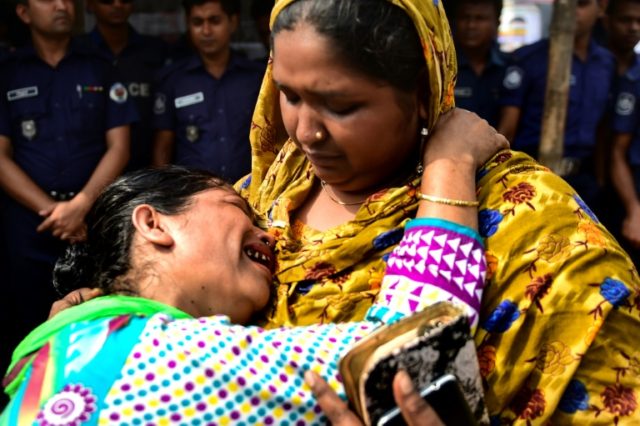Savar (Bangladesh) (AFP) – Hundreds of people staged tearful tributes Tuesday at Rana Plaza, scene of one of the world’s worst industrial disasters in 2013 when the complex of clothing factories collapsed and killed at least 1,130 people.
Survivors and the relatives of the dead placed wreaths at a concrete hammer and sickle memorial as labour groups demanded justice in a rally marking the catastrophe’s fifth anniversary.
Several people held photos of those missing and unaccounted for since the collapse. About 3,500 workers were inside the complex making clothes for top western brands when the tragedy struck, injuring nearly all those who survived.
A murder trial in the case has been repeatedly held up and noone has been convicted over the disaster despite persistent accounts of negligence.
Abdul Awwal, 58, went to the scene at Savar in the Dhaka suburbs from the northern rural district of Pabna to honour his 25-year-old daughter, Rozina Khatun. Her body has still not been found.
“She left an 11-month-old son. Her husband got married again leaving the son to us. Even after DNA tests on (the) bodies, I still have no trace of my daughter’s body,” said Awwal.
“The boy does not have any memories of his mother. He doesn’t even have a grave to mourn at,” he added, breaking into tears.
“I demand justice. I demand the body of my daughter.”
Police said some 500 people held demonstrations and small marches on the highway in front of the ruins at the start of the day.
Others arrived as the day wore on and placed wreaths at the memorial.
Police inspector Abdul Goni told AFP about 300 police had been deployed to prevent unrest.
– ‘Living dead’ survivors –
Union leaders and survivors have expressed anger at the slow pace of the trial against Sohel Rana, whose family owned the complex, which collapsed after it was illegally extended.
“We demand justice, We want Rana to be hanged. We want other criminals to be hanged,” workers chanted as they marched in front of the hole where the complex once stood, which has since been turned into a pond adorned with hyacinths.
“The injured workers have become living dead. We demand the quick trial of the culprits. Five years have gone and yet there is hardly any progress in the murder trial,” said union leader Jolly Talukder.
Talukder also demanded the release of some 1.22 billion taka ($14.5 million), which she said was donated to a government fund to help Rana Plaza victims.
The collapse triggered international outrage.
European and US clothing brands — including Primark, Mango and Benetton — were pressured to improve pay and conditions at Bangladeshi factories.
Employing some four million workers, wages in the Bangladeshi sector start at $65 a month, among the world’s lowest.
Groups which oversee safety upgrades say factories have improved since the Rana Plaza tragedy. The 20 reported accidents in 2017 was the lowest number in recent years.
A group representing more than 100 European brands warned however that “major life-threatening safety concerns remain” among the country’s 4,500 textile plants.
Several foreigners representing international textile brands also came to the memorial to pay their respects to the dead workers.

COMMENTS
Please let us know if you're having issues with commenting.